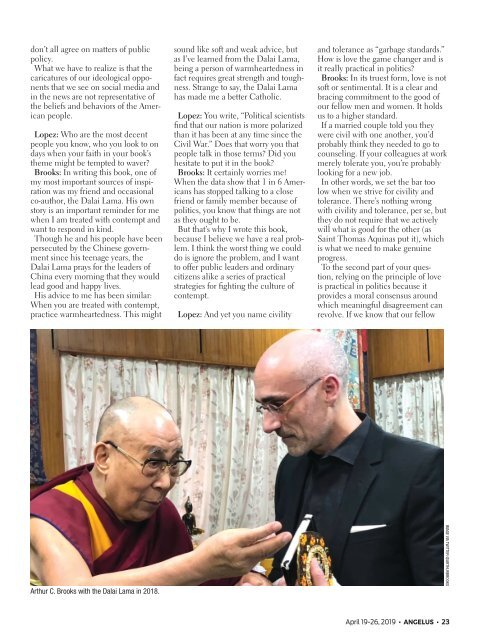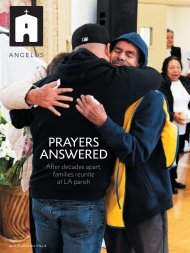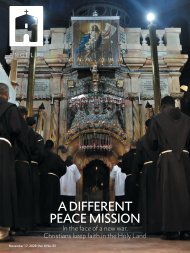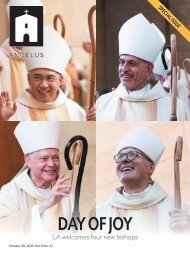Angelus News | April 19-26, 2019 | Vol. 4 No. 15
People hold candles during the Easter Vigil service at Westminster Cathedral on April 4, 2015, in London, England. Also known as the Paschal Vigil, the nocturnal liturgy celebrating the victory of Jesus Christ over death was for early Christians a night full of anticipation and dramatic symbols, rites, and singing. On page 10, contributing editor Mike Aquilina takes us back to the experience of the primitive Church to understand why the vigil was “the night of nights” for those Christians — and why it should still be for us, too. On page 16, Caitlin Yoshiko Kandil speaks to local catechumens about their road to conversion and why they’re looking forward to the “new life” of the baptism they’ll receive at this year’s Easter Vigil.
People hold candles during the Easter Vigil service at Westminster Cathedral on April 4, 2015, in London, England. Also known as the Paschal Vigil, the nocturnal liturgy celebrating the victory of Jesus Christ over death was for early Christians a night full of anticipation and dramatic symbols, rites, and singing. On page 10, contributing editor Mike Aquilina takes us back to the experience of the primitive Church to understand why the vigil was “the night of nights” for those Christians — and why it should still be for us, too. On page 16, Caitlin Yoshiko Kandil speaks to local catechumens about their road to conversion and why they’re looking forward to the “new life” of the baptism they’ll receive at this year’s Easter Vigil.
You also want an ePaper? Increase the reach of your titles
YUMPU automatically turns print PDFs into web optimized ePapers that Google loves.
don’t all agree on matters of public<br />
policy.<br />
What we have to realize is that the<br />
caricatures of our ideological opponents<br />
that we see on social media and<br />
in the news are not representative of<br />
the beliefs and behaviors of the American<br />
people.<br />
Lopez: Who are the most decent<br />
people you know, who you look to on<br />
days when your faith in your book’s<br />
theme might be tempted to waver?<br />
Brooks: In writing this book, one of<br />
my most important sources of inspiration<br />
was my friend and occasional<br />
co-author, the Dalai Lama. His own<br />
story is an important reminder for me<br />
when I am treated with contempt and<br />
want to respond in kind.<br />
Though he and his people have been<br />
persecuted by the Chinese government<br />
since his teenage years, the<br />
Dalai Lama prays for the leaders of<br />
China every morning that they would<br />
lead good and happy lives.<br />
His advice to me has been similar:<br />
When you are treated with contempt,<br />
practice warmheartedness. This might<br />
sound like soft and weak advice, but<br />
as I’ve learned from the Dalai Lama,<br />
being a person of warmheartedness in<br />
fact requires great strength and toughness.<br />
Strange to say, the Dalai Lama<br />
has made me a better Catholic.<br />
Lopez: You write, “Political scientists<br />
find that our nation is more polarized<br />
than it has been at any time since the<br />
Civil War.” Does that worry you that<br />
people talk in those terms? Did you<br />
hesitate to put it in the book?<br />
Brooks: It certainly worries me!<br />
When the data show that 1 in 6 Americans<br />
has stopped talking to a close<br />
friend or family member because of<br />
politics, you know that things are not<br />
as they ought to be.<br />
But that’s why I wrote this book,<br />
because I believe we have a real problem.<br />
I think the worst thing we could<br />
do is ignore the problem, and I want<br />
to offer public leaders and ordinary<br />
citizens alike a series of practical<br />
strategies for fighting the culture of<br />
contempt.<br />
Lopez: And yet you name civility<br />
and tolerance as “garbage standards.”<br />
How is love the game changer and is<br />
it really practical in politics?<br />
Brooks: In its truest form, love is not<br />
soft or sentimental. It is a clear and<br />
bracing commitment to the good of<br />
our fellow men and women. It holds<br />
us to a higher standard.<br />
If a married couple told you they<br />
were civil with one another, you’d<br />
probably think they needed to go to<br />
counseling. If your colleagues at work<br />
merely tolerate you, you’re probably<br />
looking for a new job.<br />
In other words, we set the bar too<br />
low when we strive for civility and<br />
tolerance. There’s nothing wrong<br />
with civility and tolerance, per se, but<br />
they do not require that we actively<br />
will what is good for the other (as<br />
Saint Thomas Aquinas put it), which<br />
is what we need to make genuine<br />
progress.<br />
To the second part of your question,<br />
relying on the principle of love<br />
is practical in politics because it<br />
provides a moral consensus around<br />
which meaningful disagreement can<br />
revolve. If we know that our fellow<br />
Arthur C. Brooks with the Dalai Lama in 2018.<br />
IMAGE VIA TWITTER @ARTHURBROOKS<br />
<strong>April</strong> <strong>19</strong>-<strong>26</strong>, 20<strong>19</strong> • ANGELUS • 23


















